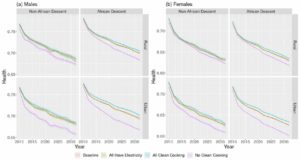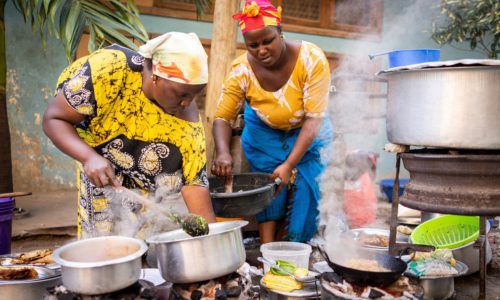
Access to clean cooking can improve the population’s health by almost 4% by 2030
- Jonathan Lungu
- April 1, 2022
- Blog
- Biogas, News
- 0 Comments
Zambia’s dependence on biomass fuels for heating and cooking poses a serious problem. The incomplete combustion of these solid fuels in inefficient cooking stoves and devices causes premature death and acute respiratory, cardiovascular, and circulatory diseases. (Smith and Pillarisetti 2017, Shupler et al 2018)
It is estimated that between 1.6 and 3.8 million people die annually from household air pollution caused by cooking with solid fuels. In Zambia alone, an estimated 8,722 [8218–19 762] premature deaths were estimated to be attributable to household air pollution in 2016.
These adverse health effects are disproportionately borne by women, children and girls, who are exposed to the majority of indoor air pollution because they spend more time at home, and particularly by women, who are primarily responsible for cooking.
Quantifying the impacts of clean cooking transitions on future health-age trajectories in South Africa

In this article, I would like to draw your attention to a research that was conducted in South Africa recently. The study quantifies the impact of various clean cooking access scenarios on future health-age trajectories among South African population subgroups.
What does a study focused on South Africa have to do with Zambia? The study’s focus is on household air pollution and clean cooking and how these relate to health. A similar study in Zambia, I believe, would yield similar results.
In Zambia alone, an estimated 8,722 [8218–19 762] premature deaths were estimated to be attributable to household air pollution in 2016.
The study used microdata from five waves of the South African National Income Dynamics Study, to develop a dynamic microsimulation model and a composite metric of individual health status that was used to investigate how health status changes under alternative access scenarios from 2010 to 2030.

-
It was discovered that using clean cooking technologies has clear benefits for population health, and that electrification alone does not improve health status unless it is accompanied by an increase in the use of clean cooking technologies in homes. The findings imply that achieving universal access to clean cooking in South Africa can improve average population health by nearly 4% by 2030 compared to a scenario without clean cooking technologies, with individuals of the poorest health and well-being endowments benefiting the most. Thus, clean cooking can help to reduce existing inequalities by improving the health of the most vulnerable populations, who rely disproportionately on polluting cooking technologies. Read the full Research here
Related Posts

- Gasbes admin
- April 11, 2022
(B)energy mobile biogas solutions coming to Zambia!
Council are celebrating the incredible achievement of the Companies and Stakeholders. Due to BI ..

- Gasbes admin
- April 15, 2022
IPCC climate report: Clean cooking tech is crucial for Climate action now
Twelve years. A report released this month by the Intergovernmental Panel on Climate Change (IP ..

- Gasbes admin
- June 23, 2022
Gasbes Energy Selected for the Biodiversity Finance Accelerator support programme
Gasbes Energy is a Zambian start-up that was founded in 2017. The company is focused on clean e ..

